The Role of a Marketing Project Manager: Responsibilities, Skills, and Real Impact
Learn what a marketing project manager does, their core responsibilities, essential skills, and how they guide campaigns from planning to delivery. Includes role comparison, workflow, and practical insights.
Ask anyone who’s worked on a marketing campaign, and they rarely go exactly as planned. Deadlines shift, feedback comes in late, assets get lost in long email threads, and suddenly, what looked like a two-week sprint turns into a month-long scramble.
That’s where a marketing project manager steps in. Their job isn’t to come up with the big idea, but to make sure that idea actually gets delivered—on time, on brand, and without burning out the team in the process.
In this blog, we’ll walk through what a marketing project manager really does, the skills that make the role effective, and why this position has become essential for marketing teams of all sizes.
What Is a Marketing Project Manager?
A marketing project manager is responsible for planning, coordinating, and delivering marketing projects from start to finish. While they may not create the campaigns themselves, they make sure the work gets done on time, within scope, and aligned with the team’s goals.
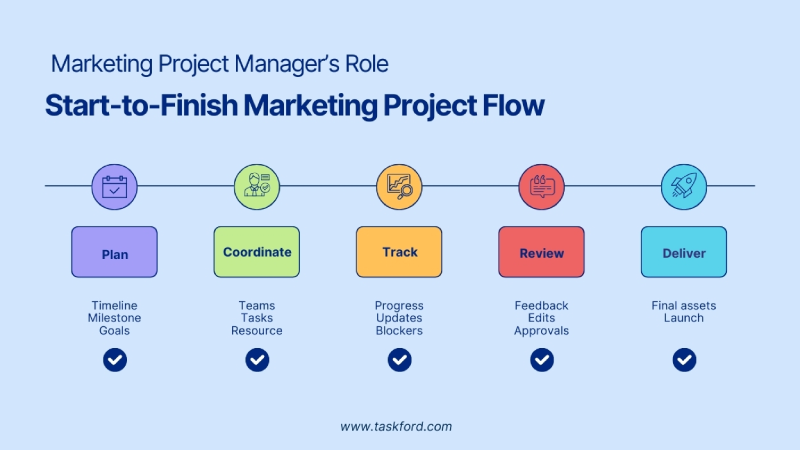
They manage the day-to-day details that keep marketing efforts running smoothly: setting schedules, organizing tasks, coordinating feedback, and making sure nothing falls through the cracks. They’re the connection point between creative teams, marketing leads, and other departments like product, sales, or operations.
What sets them apart from general project managers is their focus on the unique needs of marketing work, campaign calendars, brand guidelines, fast turnarounds, and collaboration across creative roles.
In short, a marketing project manager turns strategy into execution, helping the team stay focused and productive through every stage of a campaign.
Marketing Project Manager vs. Traditional Project Manager
Both marketing and traditional project managers aim to deliver projects successfully, but the type of work they manage is different.
- A traditional project manager often works in industries like IT, engineering, or operations. Their projects tend to follow fixed plans, technical scopes, and structured processes.
- A marketing project manager works in a faster, more flexible environment. They manage creative campaigns, coordinate across varied teams (design, content, digital), and adapt quickly to changes in direction or feedback.
Both roles require strong organization and communication skills, but their focus and pace are not the same.
Curious about the broader role across industries? 👉 Read more about What Does A Project Manager Do? for a full breakdown.
Core Responsibilities of a Marketing Project Manager
Marketing project managers are the driving force behind successful campaigns, ensuring every step from planning to execution aligns with business goals. Their responsibilities cover a wide range of tasks, from coordinating teams to tracking performance. Below are the core duties that define their role.
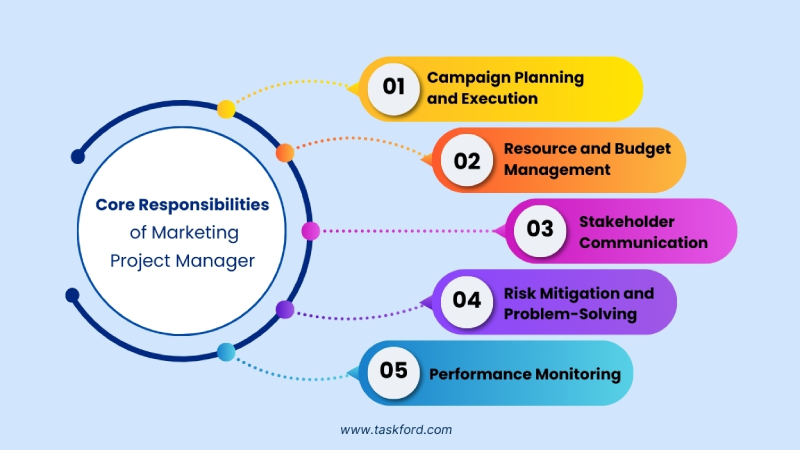
Campaign Planning and Execution
Marketing project managers create detailed plans to keep campaigns on track. They develop timelines and milestones, outlining deadlines for tasks like content creation or ad launches.
They ensure campaigns support business objectives, such as increasing website traffic by 15% or boosting sales. By coordinating cross-functional teams: designers, copywriters, digital marketers, and analysts, they ensure all tasks come together seamlessly.
Resource and Budget Management
Managing resources effectively is a key part of the role. Marketing project managers allocate budgets for campaign elements like advertisements, influencer partnerships, or software tools, keeping costs in check.
They oversee relationships with vendors, such as ad agencies or freelancers, to secure quality deliverables. By assigning team members and tools efficiently, they maximize productivity and avoid waste.
Stakeholder Communication
Acting as the central point of contact, marketing project managers keep everyone informed. They communicate with internal teams, clients, and executives, sharing progress reports through meetings or written updates. They clarify project goals and expectations to prevent confusion, ensuring all stakeholders are aligned throughout the campaign.
Risk Mitigation and Problem-Solving
Anticipating and addressing challenges is critical. Marketing project managers identify potential issues, like budget overruns or shifts in market trends (e.g., changes in social media algorithms).
They develop solutions, such as reassigning tasks or adjusting timelines, to keep projects on schedule. When unexpected obstacles arise, like technical issues or client feedback, they adapt quickly to maintain momentum.
Performance Monitoring
To measure success, marketing project managers define key performance indicators (KPIs), such as click-through rates, engagement metrics, or return on investment (ROI). They use tools like Google Analytics or HubSpot to track performance and assess whether goals were met. By analyzing results, they provide data-driven recommendations to improve future campaigns.
These responsibilities make marketing project managers essential for delivering organized, impactful campaigns that drive business success.
Skills That Make a Great Marketing Project Manager
Marketing project managers need a diverse set of skills to lead campaigns effectively and deliver results that align with business goals. Their role requires managing teams, timelines, and strategies while adapting to the fast-paced world of marketing. Below are the key skills that make a great marketing project manager.
Organizational Excellence
- Time Management and Prioritization: Juggling multiple tasks and deadlines is a core part of the job. Marketing project managers create and follow detailed schedules to ensure campaigns stay on track.
- Attention to Detail: They track budgets, timelines, and deliverables carefully to avoid mistakes, such as overspending or missing deadlines.
Leadership and Team Coordination
- Guiding Teams: They inspire and direct diverse teams, including designers, writers, and digital marketers, to work toward shared goals.
- Task Delegation: Assigning tasks based on team members’ strengths ensures efficiency and high-quality outcomes.
Communication and Interpersonal Skills
- Clear Communication: They explain ideas and updates clearly to teams, clients, and executives, whether through meetings, emails, or reports.
- Conflict Resolution: Listening to feedback and resolving disagreements calmly helps maintain a collaborative environment.
Technical Proficiency
- Project Management Tools: Familiarity with platforms like Asana, Trello, or Monday.com helps them organize tasks, track progress, and share updates.
- Analytics Knowledge: Using tools like Google Analytics or HubSpot, they monitor campaign performance and make data-driven decisions.
Marketing Expertise
- Channel Knowledge: Understanding marketing channels like social media, SEO, email, or paid ads allows them to align campaigns with the right platforms.
- Trend Awareness: Staying updated on consumer behavior and marketing trends, such as new social media algorithms, ensures campaigns remain relevant.
Adaptability
- Flexibility: They adjust quickly to changes, like shifting client priorities or unexpected delays, to keep projects moving forward.
- Creative Problem-Solving: Finding innovative solutions, such as repurposing content to meet budget constraints, helps overcome challenges.
These skills enable marketing project managers to navigate complex projects, foster teamwork, and deliver campaigns that drive measurable success.
The Impact of a Strong Marketing Project Manager
When a marketing project manager is doing their job well, things often feel smooth, even behind the scenes. Teams know what to focus on, deadlines are clear, and campaigns move forward without constant fire drills. While their work may not always be visible, the impact is easy to spot.
Here’s what a strong marketing project manager brings to a team:
- More Predictable Campaign Delivery: Projects hit their deadlines more often, and last-minute scrambles are reduced. With solid planning and active follow-up, campaigns stay on schedule, even when things shift.
- Less Miscommunication: Clear coordination means fewer crossed wires between teams. The right people get the right information at the right time, which cuts down on confusion and rework.
- Better Use of Team Resources: When work is clearly planned, teams avoid overlapping efforts or waiting on missing pieces. The result is a more balanced workload and less burnout across roles.
- Faster Decision-Making: Strong project managers surface issues early and keep stakeholders informed, so decisions don’t stall progress. They help teams move forward with confidence, not uncertainty.
- Higher Campaign Quality: With fewer delays and less chaos, teams have more time to focus on doing their best work, resulting in stronger creative output and more thoughtful execution.
- Stronger Team Morale: When projects are well-run, teams feel supported, not stretched thin. People know what’s expected of them, have the space to do quality work, and can trust that someone is keeping things on track.
How a Work Management Platform Supports Their Role
Even the best marketing project managers can’t keep everything in their heads—or in spreadsheets. A dedicated work management platform gives them the structure and visibility needed to manage complex campaigns and multiple teams without losing track of the details.
Here’s how a platform like TaskFord supports their day-to-day work:
1. Centralized Task Management
TaskFord gives marketing project managers a clear and flexible way to manage tasks across campaigns — all in one view. You can organize work by priority, set deadlines, and assign tasks to multiple team members when collaboration is needed.
With drag-and-drop scheduling, adjusting timelines is quick and intuitive, especially when things change mid-project. The workload view helps you balance team capacity and avoid over-allocating resources.
👉 Learn more about what is capacity planning here.
By centralizing task management, TaskFord helps teams stay aligned without getting buried in scattered tools or disconnected workflows.
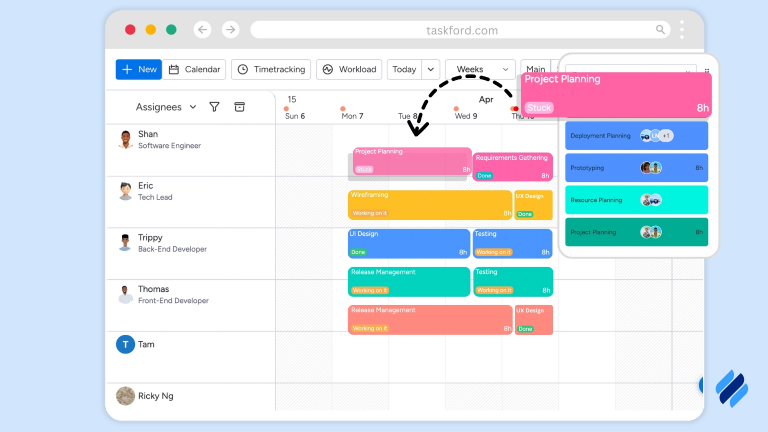
2. Real-Time Progress Tracking
In fast-moving marketing projects, visibility matters. TaskFord helps project managers track progress in real time with a clear view of each task’s status, assignees, and upcoming deadlines.
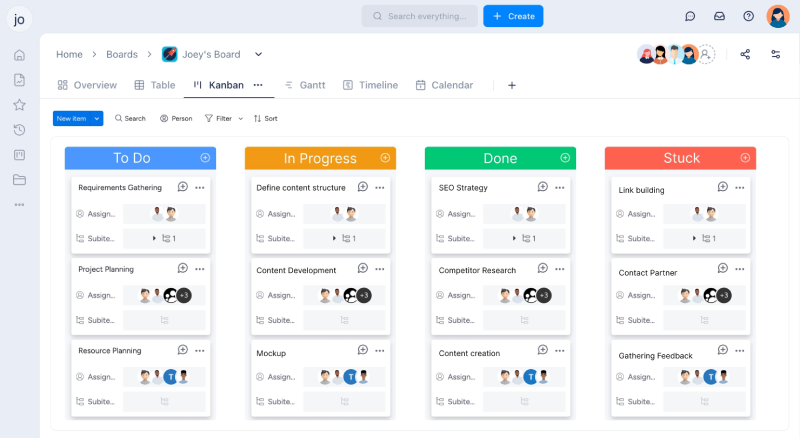
Whether managing one campaign or several at once, you can quickly see what’s in progress, what’s behind, and what’s done, without needing to chase updates manually. This allows teams to catch delays early, make informed adjustments, and keep everything moving forward with fewer surprises.
3. Clear Resource Planning
TaskFord gives marketing project managers a clear picture of how work is distributed across the team. With workload views, you can quickly see who’s overbooked, who has availability, and how project assignments are spread across time.
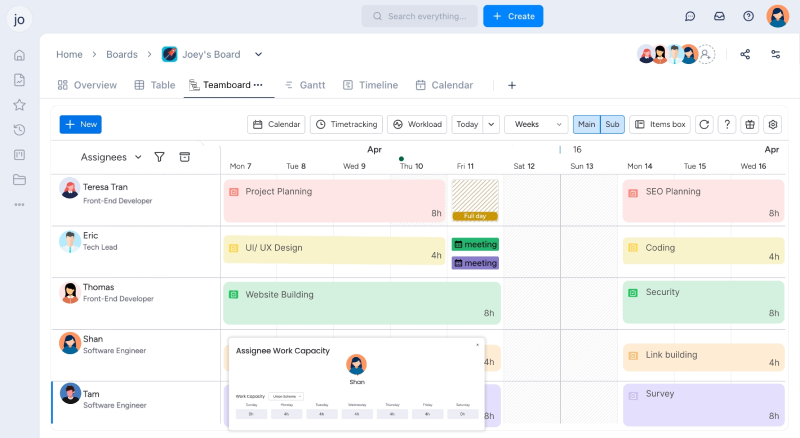
This helps with planning upcoming work more realistically – balancing tasks, avoiding burnout, and making better use of team capacity. Instead of guessing, project managers can assign tasks based on actual availability, not assumptions.
4. Structured Feedback Loops
Marketing projects often go through several rounds of feedback on visuals, copy, campaign plans, or final deliverables. Without a clear process, feedback can become scattered or hard to track.
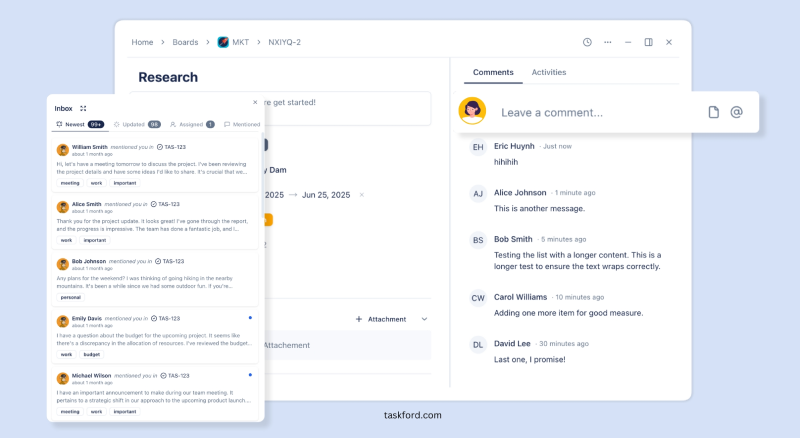
TaskFord supports structured feedback loops by allowing teams to leave built-in comments directly on tasks. You can discuss updates, ask questions, or flag revisions, right where the work is happening. For quicker coordination, task-level chat makes it easy to clarify details without switching tools.
5. Budget Awareness and Tracking Support
While marketing project managers may not own the entire budget, they’re often responsible for staying within it, especially when managing freelancers, vendors, or paid media.
TaskFord supports cost tracking by keeping project scopes, timelines, and resource allocation in one place. While it’s not a dedicated financial tool, having visibility into time spent, team workloads, and overall progress helps project managers make more informed decisions.
![]()
This allows them to catch scope creep early, adjust plans as needed, and keep work aligned with what the budget can actually support.
Final Thoughts
Marketing project managers may not be the ones writing copy or designing graphics, but their work is what brings it all together. They create the structure that allows creative teams to focus, stakeholders to stay informed, and campaigns to move from idea to launch, without losing momentum.
From scheduling to task tracking, feedback coordination to resource planning, their role touches every part of the marketing process. And with the right tools, like TaskFord, they’re able to manage the complexity of modern marketing work with clarity and control.
If you're building out a marketing team or stepping into this role yourself, understanding the value of project management in marketing is a solid place to start.
Related Resources
- What is Project Management - A Beginner’s Comprehensive Guide
- AI project management: A Look at 2025 and Beyond
- Types of Project Managers - Industry-Specific Project Managers: Roles, Skills, and Work Environments
Making work simpler,
smarter, and more connected
Join our waitlist and be notified first.

Related Blog
Subscribe for Expert Tips
Unlock expert insights and stay ahead with TaskFord. Sign up now to receive valuable tips, strategies, and updates directly in your inbox.






